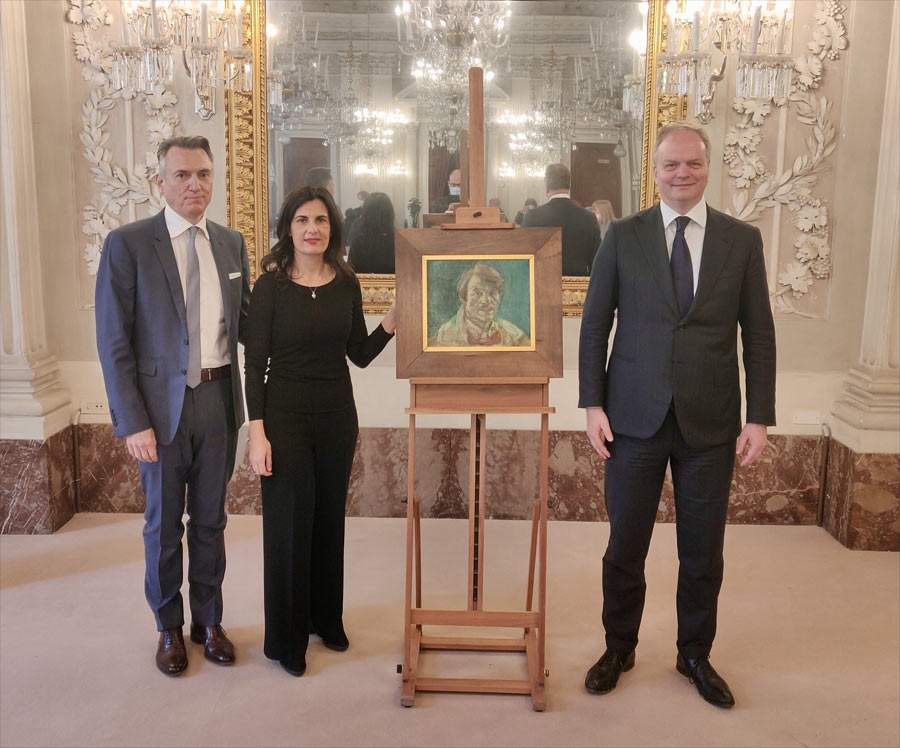The Uffizi pays tribute to the great Russian filmmaker Andreij Tarkovsky on the 90th anniversary of his birth
The Uffizi pays tribute to the great Russian film director Andreij Arsen’eviÄ Tarkovsky (Zavrazh’e, 1932 - Paris, 1986) on the 90th anniversary of his birth with readings, music and testimonies, all in the White Room of the Pitti Palace, where poems by the director’s father, Arseny Tarkovsky (considered one of the main protagonists of 20th-century Russian poetry) reproduced on large panels have been displayed, and where, right in the center of the room, a a portrait of Andrei Tarkovsky by painter Americo Mazzotta was placed.
During the celebratory day (Andreij Tarkovsky was born on April 4), actor Gianluigi Tosto read excerpts from the lecture on the Apocalypse of St. John that the director gave at St. James Church in 1984. James Church in 1984; between passages, violinist Natascia Gazzana performed pieces of classical and other music: Johann Sebastian Bach (1685-1750), Adagio from Sonata I in G minor BWV 1001; Johann Sebastian Bach (1685-1750), Allemande from Partita II in D minor, BWV 1004; Tõnu Kõrvits (1969), Monologue from the Stalker Suite; Ilja Demutsky (1983), The second answer from Four answers to a simple question; Valentin Silvestrov (1937), Serenada. Besides Bach, beloved by Tarkovsky, the selected compositions were created by a Russian (Ilja Demutsky), a Ukrainian (Valentin Silvestrov) and an Estonian (Tõnu Kõrvits) composer.
Remembering Tarkovsky with moving remarks during the event were the director of the Uffizi, Eike Schmidt, the director’s son and President of the Andrej Tarkovskij International Institute, Andrej AndreeviÄ Tarkovskij, and then again Stefano Garzonio, Professor of Russian Language and Literature at the University of Pisa, and Andrea Ulivi of Edizioni Meridiana.
“Thanks to his cinematic works of art Tarkovsky contributed to all of humanity, so paying tribute to him is even more fitting at a time of tensions like this,” Eike Schmidt stressed, “and doing so here in the Pitti Palace has special significance because the last project he was working on when he left us was dedicated to Dostoevsky: Dostoevsky himself, here in Piazza Pitti, wrote parts of his masterpiece The Idiot. Russian artists have contributed to the culture of the world, now they should not be obscured. This should not be allowed.”
“Today,” Andrej AndreeviÄ Tarkovsky added, “in the dramatic situation we are living in, talking about Tarkovsky is even more relevant. And it is still important and symbolic to do it here in Florence, at the Uffizi, the museum he most loved and appreciated in his lifetime. My father was never a dissident but he contested the materialism of society, the loss of the ability to research, to develop our spirituality. Our technical, material development has grown, gone far beyond, but our spiritual development has stood still. That’s why society is wrong, that’s why we have wars.”
The event, broadcast live on Facebook on the Galleries page, was watched by thousands of people.
Pictured: Andreij AndreeviÄ Tarkovsky, Natascia Gazzana and Eike Schmidt with a portrait of Tarkovsky.
 |
| The Uffizi pays tribute to the great Russian filmmaker Andreij Tarkovsky on the 90th anniversary of his birth |
Warning: the translation into English of the original Italian article was created using automatic tools. We undertake to review all articles, but we do not guarantee the total absence of inaccuracies in the translation due to the program. You can find the original by clicking on the ITA button. If you find any mistake,please contact us.



























